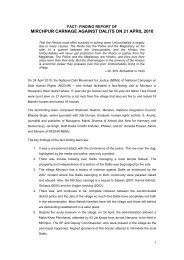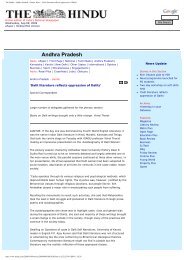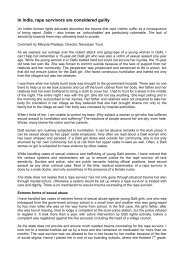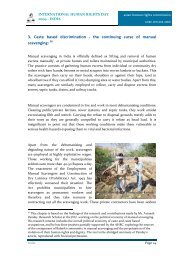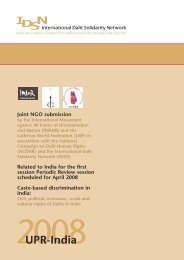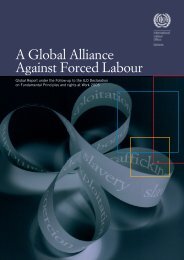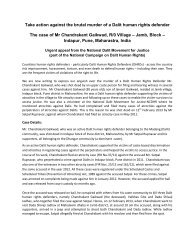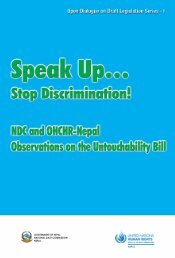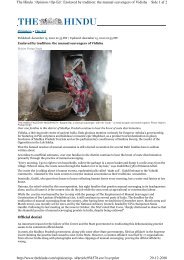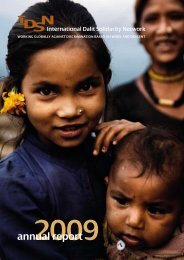equal by law, unequal by caste - International Dalit Solidarity Network
equal by law, unequal by caste - International Dalit Solidarity Network
equal by law, unequal by caste - International Dalit Solidarity Network
You also want an ePaper? Increase the reach of your titles
YUMPU automatically turns print PDFs into web optimized ePapers that Google loves.
Vol. 26, No. 2 Equal <strong>by</strong> Law, Un<strong>equal</strong> <strong>by</strong> Caste 341mechanisms against their actual impact in promoting basic human rightsis a first and necessary step. This Article offered a bottom-up view ofhow the <strong>law</strong> operates, or is denied, in practice, and examined how therule of <strong>law</strong> lives in the shadow of the rule of <strong>caste</strong>. It concluded thatreservations are an attempt, however imperfect, to <strong>equal</strong>ize opportunityin the face of a social structure that is antithetical to <strong>equal</strong>ity ofopportunity. Reservations create the possibility of a meritocracy in asystem that is functionally anti-merit. Yet conversations aboutaffirmative action stagnate around the question of whose disadvantagedeserves protection and for how long, and fail to ask who stands tobenefit from systematic social exclusion. Reservations alone constitutean insufficient remedy to the problem of <strong>caste</strong> discrimination in India.Controversy over the reservations scheme has also allowed the debate topredictably stagnate around the distribution of “privilege,” taking thefocus away from violations of basic rights.To say that the road that we are on will eventually get us to aplace where one’s race and <strong>caste</strong> will no longer be determinative of one’sclaims over resources or one’s very human personality is false. One’s“untouchable” status continues to act as a bar to material progress, accessto justice, and to development of human personality. The passage oftime has not witnessed discrimination’s elegant decline, but its sadisticentrenchment. Growing movements <strong>by</strong> <strong>Dalit</strong>s to claim their basic humanrights and their human dignity are increasingly met with large-scaleviolence and attempts to further remove <strong>Dalit</strong>s from economic selfsufficiency.While the stark disjuncture between constitutional vision andsocial reality quickly gives way to indignation, the call to action is stilldirected at the state, using top down approaches that assume a selfexecutingquality of the <strong>law</strong>. Human rights strategies must instead beinformed <strong>by</strong> the twin goals of remedying the effects of discriminationand dismantling the discriminatory mindset. Without the latter, the<strong>equal</strong>ity project will <strong>by</strong> definition remain incomplete.This Article has attempted to shift the debate on <strong>caste</strong> and offerbroader insights into the discursive role of the <strong>law</strong> in undermining realreform. Entrenched forms of discrimination stemming from the world’slongest surviving system of social hierarchy offer valuable lessons andcautionary tales applicable to the broader <strong>equal</strong>ity project. The first andmost obvious is to look beyond “race” as the only arbiter of rights. Thesecond is to look beyond the mere existence of affirmative action



